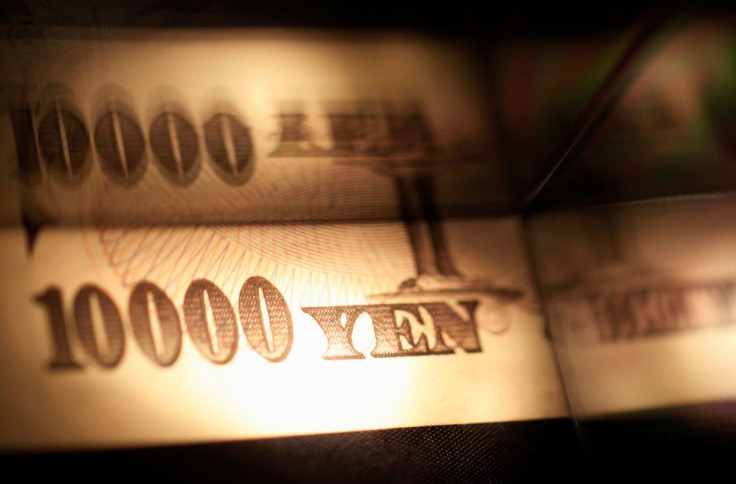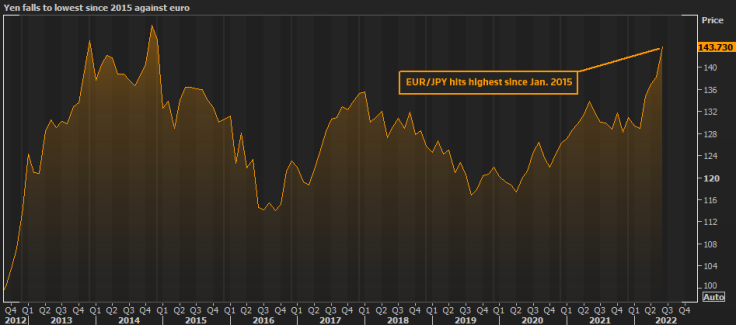Yen Tumbles Against Euro As Central Bank Policy Diverges

The euro hit a seven-year peak against the yen on Wednesday, getting a lift after an upward revision to first quarter growth and ahead of a European Central Bank meeting on Thursday that is likely to pave the way for rate hikes later in the year.
The ECB is set to end its bond purchases this month, meaning rate hikes can commence in the second half of 2022, leaving the Bank of Japan (BoJ) standing alone amongst its peers with its ultra-loose monetary policy.
The yen has now fallen for 10 consecutive trading sessions against the euro, its longest losing streak in eight months, and reached a seven-year low of 143.89 per euro in European trade.
The euro gained 0.2% against a broadly stronger dollar at $1.07225, after earlier trading lower by 0.3%, as euro zone first quarter economic growth was revised higher.
"EUR/USD has held up quite well in the face of this week's dollar strength," ING analysts said, noting that the prospect of a hawkish ECB had supported the euro.
Money markets are now pricing in 75 basis points of rate increases from the ECB by September, implying traders expect a 50-basis-point hike at either the July or September meeting.
Meanwhile, the Federal Reserve looks all but set to raise its interest rate by 50 basis points for a second consecutive meeting next week, in contrast to the BoJ, which has shown no signs of ending its easy policy stance.
The U.S. 10-year yield rose 4 basis points, consolidating around the 3.0% mark after breaking back above that level on Monday.
Spreads between 10-year U.S. and Japanese debt widened to around 277 bps, not far from a 3-1/2 year high of 292 basis points hit last month.
This has helped push the dollar to a 20-year peak of 134.135 yen, with the Japanese currency losing almost 5.5% against the U.S. currency in the past eight trading sessions.
"When yields move, dollar-yen moves; that's why it looks a little abrupt in the price action," said Lars Sparreso Lykke Merklin, senior analyst at Danske Bank.
"Indeed, the monetary policy of holding their ground amid everyone else moving to hike is causing yen to weaken," he added.
Even so, there are still few signs that the BoJ might step in to support the currency.
BoJ Governor Kuroda told parliament on Wednesday that yen weakening was positive to the economy as long as moves were stable, while adding that FX policy was not the authority of the BoJ.
The dollar index, which measures it performance against a basket of currencies, including the euro and the yen, rose 0.1% to 102.53.
Elsewhere, the pound fell 0.4% against the dollar to $1.2540, as political risks and fears of a slowing economy weighed on sterling.
The Aussie and kiwi were both weaker, falling 0.5% and 0.6% against the dollar, respectively.
The safe-haven Swiss franc also declined, dropping to a near three-week low against the dollar of 0.9789 francs.
China's yuan was not immune from the dollar strength, easing against it pressured by market worries over increasingly divergent monetary policy stances between China and other major economies.
In cryptocurrencies, bitcoin was down 2.4% but above the $30,000 threshold, while ether was down 0.5% at $1,802.
GRAPHIC: EURJPY2 (

)
© Copyright Thomson Reuters 2024. All rights reserved.







